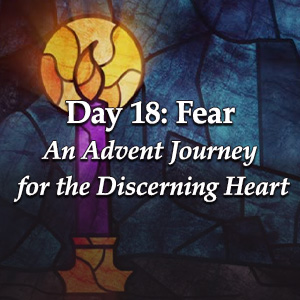Podcast: Play in new window | Download (Duration: 6:02 — 4.3MB) | Embed
Subscribe: Apple Podcasts | Spotify | Amazon Music | Android | Pandora | iHeartRadio | JioSaavn | Podchaser | Gaana | Podcast Index | Email | TuneIn | Deezer | Anghami | RSS | More
An Advent Journey for the Discerning Heart:
Prepare your heart for Christ through Scripture, the saints, and the gentle practice of daily listening.
Part Three: Listening Through Trials, Weakness, and Silence
 DAY 18 – Fear
DAY 18 – Fear
“When I am afraid, I put my trust in You.”
Psalm 56:3 RSV
Fear touches every human heart. We long for security, assurance, and answers. We want to know that we are safe and that there is a solution waiting for what troubles us. Yet fear, when left unchecked, can cripple the very movement of faith that would lead us toward those things. It narrows our vision, boxes us into what we know, and blinds us to the new and unexpected ways God desires to act in our lives.
There is a fear that protects, the kind that keeps us from danger or awakens the conscience to sin. This holy fear is the beginning of wisdom. But there is also a fear that confines. It is the fear that doubts God’s goodness, hesitates to trust His timing, and clings to control. That fear keeps us from receiving grace.
The discerning heart must learn to recognize both kinds. Christ calls us not to eliminate fear but to bring it to Him, where love can transform it. “There is no fear in love, but perfect love casts out fear.” (1 John 4:18) The love of God does not always remove uncertainty. It fills it with His presence. Faith grows when we choose to move toward Him even when the outcome is unclear.
Advent reveals this mystery: divine love enters the world where human fear reigns, and through Christ, teaches the heart to trust again. In Him, we learn that faith is not the denial of fear, but the act of bringing our fear into His presence. When the heart surrenders its need for control, grace restores peace and confidence. God does not remove every uncertainty, but He remains with us in it, guiding and protecting us with His love.
Journey with the Saints –
St. Pio of Pietrelcina
“Pray, hope, and don’t worry. Worry is useless. God is merciful and will hear your prayer.”
St. Pio of Pietrelcina, Letters, Vol. III
For St. Padre Pio, fear was not something to wrestle with alone but something to entrust to God. He taught that peace begins when we stop trying to manage everything by our own strength. The things that belong to God—the outcome of events, the timing of answers, the care of those we love—must be placed back in His hands.
Pio endured misunderstanding, illness, persecution, and interior trial, yet his words remained steady: “Fear nothing. God is with you, and He is more powerful than all the evil in the world.” His calm came from knowing that God’s providence governs every circumstance.
He shows the discerning heart that faith does not erase fear. It transforms it. When fear is lifted to God in prayer, grace renews strength and trust begins to grow again.
Reflection for the Listening Heart
Where am I clinging to certainty or control?
Where do I demand answers rather than trust God’s unfolding?
Fear often disguises itself as the desire for safety. But when it leads me to shrink from grace, it becomes a chain that holds me back from the very assurance I seek. God does not want to silence our fears as much as He wants to meet us within them.
The discerning heart learns to tell the difference between the fear that protects and the fear that confines. Faith listens for God’s invitation to move toward love, even when the path is uncertain.
Ask yourself: What fear keeps me boxed into the possible I can imagine, instead of the endless possibilities God can bring?
A Simple Practice for Today
Choose one verse from today’s Scripture, perhaps “When I am afraid, I put my trust in You.”
Sit with it for one quiet minute and say, “Speak, Lord, I am listening.”
Later in the day, pause and take a slow breath. Say, “Lord, free me from the fear that limits Your work in me.”
Let both moments open your heart to the greater possibilities of faith.
Prayer
Lord Jesus, You know my longing for certainty and control.
When I am afraid, teach me to trust You more than my own plans.
Through the witness of St. Padre Pio, help me to pray with confidence, to hope with peace,
and to believe that Your love holds possibilities beyond what I can imagine.
Let Your perfect love cast out fear and make my heart ready for Your coming.
Come Lord Jesus.
Amen.
For more of the episodes of
An Advent Journey for the Discerning Heart with Kris McGregor visit here
Citations for Day 18
Psalm 56:3–4 (RSV)
1 John 4:18 (RSV)
St. Padre Pio, Letters, Vol. III
© Discerning Hearts. All rights reserved.



